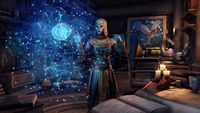Lore:Tjurhane Fyrre
| Sage Tjurhane Fyrre | |||
|---|---|---|---|
| Race | Ayleid | Gender | Male |
| Born | 1E 2790 |
||
| Died | 2E 227 |
||
| Resided in | University of Gwylim | ||
Tjurhane Fyrre was considered one of the finest Sages of the University of Gwylim, which he founded in the province of Cyrodiil.[1] He was one of the few known remaining Ayleids, being born in the late First Era and dying at the age of 357 in the late-early Second Era. Tjurhane Fyrre studied the history of his people, when it was the Ayleid Empire, to when it became the tribal people of Tamriel. He was one of the few to publicly speak about his people and their religion, describing them as follows: "the nature of the tribes of Ayleid are multi-hued, their personalities often wildly different from their neighbor tribes."[2]
History[edit]
Based on the dates of his birth and death, Fyrre was born during the time of the Second Empire, beginning with Kastav's reign, and into the period of the Akaviri Potentate, during the reign of Versidue-Shaie. In 2E 12, Tjurhane had released a book known as the Nature of Ayleidic Poesy, which is where his quote on the Ayleid tribes originates from.[2]
He was the founder of the Antiquarian Circle, the University of Gwylim's historical society.[3]
He also invented the Antiquarian's Eye, a tool that allowed the wielder's mind to travel vast distances and find buried relics. It was developed along with countless other scholarly tools. Before his death, Fyrre stored several Antiquarian Eyes in a vault in Elinhir, intended for the University's best and brightest to continue his work after he was gone, but Fyrre died before he could demonstrate the Eye's true potential.[1]
Some of Tjurhane Fyrre's last writings were about the life of Narilmor, King of Garlas Malatar, who sealed his city amidst the Alessian Slave Rebellion. His writings were later taken by the Second Empire following his death, courtesy of the University of Gwylim. His notes led to their interest in Garlas Malatar, where they built Fort Mistwatch.[4][5]
Known Writings[edit]
- Meet the Character - King Narilmor by Tjurhane Fyrre — Biography of a zealous Meridia worshipper
- Nature of Ayleidic Poesy by Tjurhane Fyrre
References[edit]
- ^ a b Verita Numida's dialogue in ESO
- ^ a b The Wild Elves — Kier-Jo Chorvak
- ^ An Introduction to Circle Correspondence — Verita Numida
- ^ Meet the Character - King Narilmor — Tjurhane Fyrre
- ^ Tharraya's dialogue in ESO Wrathstone
